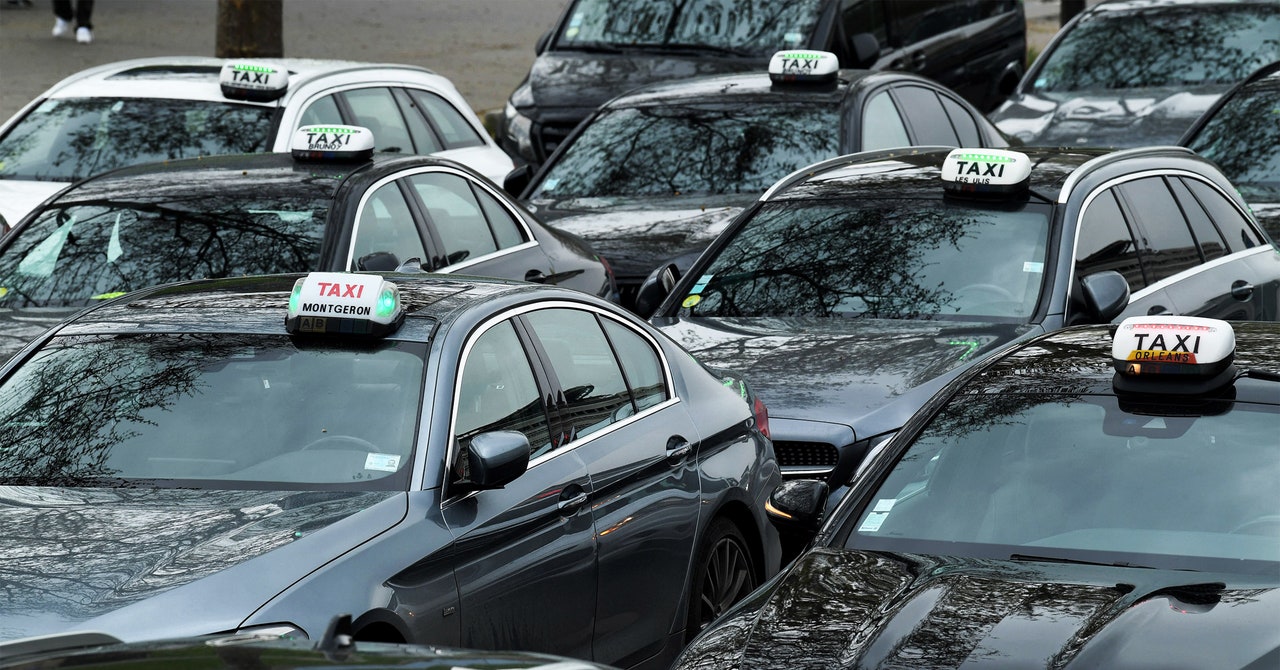Drivers like Hubert may be skeptical of Uber’s deals, but there is real hostility towards the company within some unions. “We don’t expect anything from Uber. It is a predatory multinational corporation that cares little for its employees, little for its customers, and tries to impose its rules by force on the states where it operates,” said Karim Asnoun, a former taxi driver and the secretary of the CGT Taxis union. “It respects nothing, and the taxi is just a pawn in its strategy.” Conditions on platforms like Uber are very unfavorable for drivers because their commissions are very high, he adds.
But Uber is trying to overcome their distrust by offering aggressive incentives to encourage taxi drivers in Paris to sign up. “Today, there is no commission charged for taxis in Paris,” says Asnoun, adding that taxi drivers received a €1,000 (or $1004) bonus for joining the app. Uber declined to provide details on how long these incentives would remain in effect. Incentives are a regular part of Uber’s service when a new feature is launched, Diaz says. “We’re obviously encouraging…drivers to use the app, to try it out and see the benefits it brings to them.”
Those same terms have not been extended to all markets where Uber has closed deals. In Belgium, where Uber Taxi also launched this month, Uber will receive a 10 percent discount on the income of new drivers, says Tom Peeters, deputy federal secretary of BTB-ABVV, a road transport and logistics union that signed the EU’s first union agreement. with Uber. in October. IT Taxi, Italy’s largest taxi forwarder, which also signed a deal with Uber in July 2022, did not respond to WIRED’s questions about the commission their 12,000 drivers pay Uber or how the deal affected their revenue.
Taxis can already be ordered through Uber in 225 cities around the world, Diaz says. New York’s yellow taxis have been available on the app since September. In the EMEA region, taxis are available in 70 cities in 17 countries, although an Uber spokesperson declined to name which ones. Diaz hopes to further expand Uber Taxi into new markets, including London, the company’s largest European market. “Including black cabs in our London app would be an ideal scenario for us,” she says.
Yet there is still animosity between the British capital’s black cabs and Uber, after years of competition and court battles. “Uber was trying to destroy us,” said Grant Davis, president of the London Cab Drivers Club, who has been a black cab driver for 35 years. “We don’t need Uber, we have other apps like Free Now, we have Gett and there’s another new app that is commission-free and owned by taxi drivers.” These services charge about 10 percent commission, he adds.
Fragmented regulations across Europe have always been a problem for Uber, and boarding taxis will be complicated, especially when many cities, such as London, have strict rules about how much taxis can charge. Although taxi legislation in Belgium changed in October in favor of Uber, there are still places where legislation is limiting the company’s ambitions. In Barcelona, the rules are still very, very restrictive,” says Diaz. “This is an example of a place where rules like minimum wait time are still applied, and that’s very restrictive to create the service we want to create.” The government in Catalonia, a region in northeastern Spain, introduced new rules in 2019 requiring a 15-minute wait between making a booking and picking up a passenger.Uber is also bracing itself for EU-wide regulations, which is expected to introduce new rules on who qualifies as self-employed.
These taxi deals could represent a new approach in Uber’s pursuit of ride-hailing’s global dominance. But arguments for and against the company’s integration of taxis into the app feel like the same old battle to control the industry’s future. Diaz argues that the future still leans in Uber’s favor. “I come from a time when street taxis were common, and I know how to do it,” she says, as new generations “expect things to happen on their phones — instantaneously, efficiently and sustainably.”
Parisian taxi driver Hubert does not dispute that apps are the future of the taxi industry. As in London, Uber has competition in the French capital to help taxi drivers reach a wider audience. A French app called G7 is increasing its pay by 30 percent, he says; he claims that the monthly subscription fee of €320 ($321) puts less pressure on him than Uber’s 25 percent commission. “The future will be digital,” says Hubert. But, he adds, it’s not necessarily from Uber.

